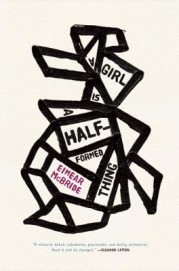 Eimear McBride
Eimear McBride
Coffee House Press ($24)
by Alex Brubaker
Eimear McBride’s debut novel, A Girl is a Half-formed Thing, begins with a jolt to the reader’s sense of language, reality, and any traditional form of exposition for a novel. The book opens with the unnamed narrator at two years old, and McBride effortlessly weaves in and out of her head and the external world as she grows older and the novel progresses. It is disorienting, complex, and at times nonsensical. But once the reader is able to reorient herself to the structure of the novel, McBride provides a singularly unique experience that is unlike any other book in recent memory.
A Girl is a Half-formed Thing feels personal as it details the inner life of its complex protagonist, who invokes feelings of intimacy, revulsion, and at times, heart-wrenching sympathy. The novel follows the narrator as she comes of age, surrounded by a struggling single mother, her tragic brother, a predatory uncle, and an abrasive religious background. It isn’t the plot that makes the book stand out, but the intense focus on language and the ways in which it shapes our reality.
McBride evokes a hard-fought empathy to make the reader feel as if they have slipped off the page and into the narrator’s head. Via choppy sentences, stray signifiers, and other linguistic devices, we go where the narrator goes and we feel as she feels. The attempt to invite the reader into this intimate space through broken language is a daring and difficult feat, and McBride pulls it off. As we get pulled through the muck of unconventional language and fractured narration, the effect is mesmerizing:
And I wonder sometimes for her. Would you be better off dead? Don’t say that. Don’t you ever say that. I say it in me. But. That’s forever now. Look. That is me. My thoughts. Are all shame.
This line of thought is audacious, uncomfortable, and uncompromisingly human. McBride isn’t afraid to explore the dark: whether examining sex, religion, or death, she collides with it head-on in a show of literary artistry that can be only called a transcendent reading experience. With its portrait of a beautifully complex character groping for comfort and happiness in a world that more often than not refuses to reciprocate, A Girl is a Half-formed Thing may not give us solace and sentimentality, but it does offer a well-wrought glimpse of humanity.

